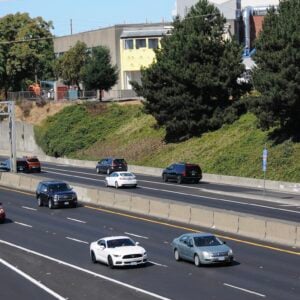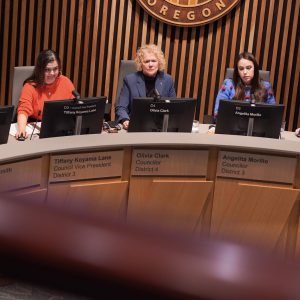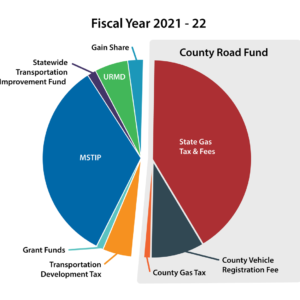With the State of Oregon’s bleak transportation funding picture becoming clearer, it was with great interest that I read a report on Publicola today about how Washington state is dealing with the problem.
According to a story by Publicola’s Erica Barnett, Governor Chris Gregoire mentioned a new transportation package in her state of the state speech today:
“… she outlined a “major transportation and jobs package” that includes a $1.50-per-barrel fee on oil and local taxing and fee-setting options for cities and counties to raise money for roads and transit without going to a public vote. Unlike taxes, which require supermajority (two-thirds) approval, the oil fee would require only a simple majority vote of the legislature.”
The package would reportedly raise $3.6 billion over ten years thanks to a $1.50-a-barrel fee on oil produced in Washington State; a $100 fee on electric vehicles; a 15-percent increase in license fees for heavy commercial vehicles; a $15 weight fee on passenger vehicles.
Here’s more from Publicola:
Specifically, the proposal includes:
• $2.67 billion for highway operations and maintenance;
• $310 million in grant funding for cities and counties to maintain roads and bridges;
• $150 million in grant funding to offset transit service cuts;
• $200 million for the Washington State Patrol; and
• $100 million to preserve Amtrak service.
Interesting to note that Publicola says Governor Gregoire specifically mentioned the controversial Columbia River Crossing project as one of the things awaiting to be built in her speech.
Interestingly, I recall an oil tax proposed (albeit informally) by Oregon Congressman Peter DeFazio during a visit to his office on Capitol Hill during the 2009 National Bike Summit. Rep. DeFazio’s idea was a $1 per barrel sales tax which he said would raise $6.5 billion a year.
OK Governor Kitzhaber: It’s your turn.
— Read the full article on Publicola.com
UPDATE: Washington’s largest bike advocacy group, Cascade, has issued a response. I like the statement from their Policy and Gov’t Affairs manager Craig Benjamin:
“Especially during these challenging economic times, if we are going to spend billions of limited taxpayer dollars on our transportation system, we must do more than tread water and maintain the status quo. We should make smart, cost-effective investments that maximize the movement of people and goods in Washington state. Bicycle, pedestrian and transit projects reduce congestion and our dependence on oil, create more jobs than highway construction, improve public health, provide Washingtonians with more options to safely get where they need to go and prepare our state for the future. We thank Gov. Gregoire for starting this important conversation and look forward to working with the legislature and the governor to balance this package with adequate funding for the Pedestrian and Bicycle Safety, Safe Routes to School, Complete Streets & Main Street Highways and Regional Mobility grant programs.”







Thanks for reading.
BikePortland has served this community with independent community journalism since 2005. We rely on subscriptions from readers like you to survive. Your financial support is vital in keeping this valuable resource alive and well.
Please subscribe today to strengthen and expand our work.
$1.50-a-barrel fee on oil produced in Washington State?
There is no oil production in the state of Washington.
Do they mean oil refined in Washington? This would also tax Oregon, but it would likely be a tax on interstate commerce.
How about a $10/barrel tax on all imported oil?
That “fee” sure sounds like a tax to me. I’m all for taxing oil and drivers, but that approach seems a bit dishonest.
It’s clear the $3.6 billion package doesn’t include funding for the CRC highway mega-project.
The funding effort – if it passes muster – is for operations and maintenance, not the additional $21 billion in wish list items Gregoire mentions in her speech, which includes the CRC and several other projects.
Gregoire is not running for reelection so her proposals are fairly meaningless.
Actually, her proposals have a lot of weight, as she can veto anything the legislature does during the session. She’s the most powerful person in Washington, albeit not as powerful as she once was.
Washington seriously needs some new leaders that have their spending priorities in the right place.